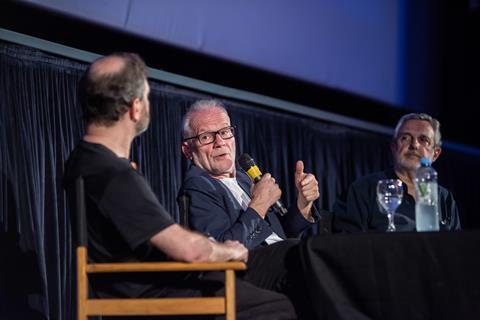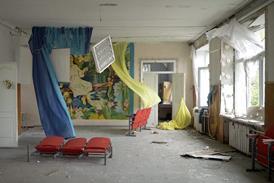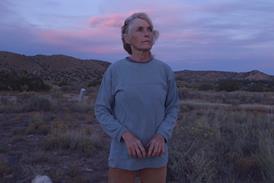
Cannes Film Festival delegate general Thierry Frémaux discussed cinemagoing, streaming, and the emerging generation of Argentinian auteurs in a Ventana Sur masterclass in Buenos Aires.
Under the banner ‘The Future of Cinema’, Frémaux, speaking fluent Spanish, reflected on platforms, cinema’s DNA, Cannes selection policy, and the importance of classic films with local journalists and critics Diego Batlle and Luciano Monteagudo.
As part of Frémaux’s annual participation in the Buenos Aires market the delegate general curates Cannes Film Week, which runs through December 3. This year’s selection includes Croisette favourites Anatomy Of A Fall, Justine Triet’s Cannes Palme d’Or winner, as well as Wim Wenders’ Perfect Days, and Jonathan Glazer’s The Zone Of Interest.
The DNA of cinema
Frémaux paid tribute to his origins. He was born in Lyon, home of the Lumière brothers, and runs Lumière Institute and Lumière Film Festival devoted to classics.
“It’s the victory of the Lumières’ invention over the Edison machine,” he said of cinema. “The Lumière brothers. invented the cinematograph involving the idea of going to the theatres, instead of Thomas Edison’s ‘kinetoscope’ [projection system], which refers exclusively to the machine. Even US audiences go to the theatre; they don’t go to the kinetoscope,” he said.
Referring to the post-pandemic period, Frémaux said: “Many questions came up at the time, but this year many people think that the last edition of Cannes was one of the strongest ones. The films that we’re going to see in Ventana Sur are samples of pure cinema.”
He continued, “Never in history had the theatres been closed for such a long time. And some questions arose: why is cinema so necessary if it is so easy to watch films from home? What will happen to cinema in the future? As the most prestigious festival, we [Cannes] should have an answer: cinema will go these two ways … cinema will be saved by the artists.”
Platforms and cinema-going culture
Frémaux addressed how streaming platforms and cinema interact, and also spoke to the familiar question of how Cannes engages with Netflix.
“Some years ago, nobody was very clear what would happen with the platforms’ arrival,” he said, noting that directors have not stopped directing features. “Now, we work with them, and they do important work. Amazon and Apple had nothing to do with cinema but being so wealthy, they had the dream to become involved in cinema. This is good news. Now we need them to produce cinema.”
Netflix is its own case, the Cannes supremo said, as the streamer does not accept the festival’s requirements for films playing in Competition to commit to theatrical distribution in French cinemas.
“We accept films that won’t go to theatrical in other sidebars,” he said. “We have programmed works from directors such as David Lynch, Nicolas Winding Refn, Jane Champion… David Fincher has worked [mostly] for Netflix in the last 10 years. But who invented the cinema, the box office, the reviews, the ‘fights’ about a movie?”, Frémaux wondered aloud, adding that he invites Netflix to submit to the festival each year.
Frémaux said Netflix co-CEO Ted Sarandos was a cinephile “but their system is a different one”. He added, “We at Lumière Institute do screenings of Netflix movies. They make a DCP and people come because they want to see that movie in the theatre.”
“When Apple decided to theatrically launch Killers Of The Flower Moon it was great news,” he said, recalling the time Scorsese invited him to his 80th birthday and wanted to show him something. “It was a three-and a-half-hour ‘something’,” Frémaux laughed. “When Apple accepted and I could have the film from my friend in Cannes, my happiness was enormous … I have the feeling that if a film by a director such as Scorsese doesn’t go to a festival, it’s as if it comes from a different ecosystem and it’s a different thing. Cinema is a big show when seen on a big screen”.
In this boom time of platforms, the Cannes head noted, “It is incredible when Daniel Burman, Nicolas Winding Refn, or Paolo Sorrentino tell me, ’We want to make a film again’. Burman told me that it was a great joy for him. This is good news.”
Keeping classics alive
“Seeing [a restored version of] Seven Samurai in Lyon is like being in New York and seeing Les Demoiselles d’Avignon [Picasso’s painting at MoMA] or a painting by Mark Rothko. It is to see a work as it was made.”
Frémaux said that with the rise of streaming the links between past and present were stronger than ever. “We can watch movies we couldn’t easily see before … There are directors who are not interested in classic cinema, and others, like Scorsese, who feed on it. The challenge of the future lies in the past. You have to take the past into the present, not for nostalgic reasons, but because it’s really important. Tarantino’s work could not exist without his cinema culture. It’s like Borges, whose work was so anchored in the past. Tarantino is the Borges of cinema.”
He added that “like literature or art, cinema is a way of entering and knowing a world”. He contrasted the public response to a Paris retrospective of Rothko and an exhibition on Picasso last year to screenings of cinema classics.
“No-one asks, ‘Why see these old artists now?’ But if we do a retrospective of Jean Renoir or Orson Welles… the attitude is not the same. There is much work to be done for cinematheques, journalists.
“Cinema will not die,” he noted. “Do you know who invented TikTok? The Lumière brothers with their shorts.”
The need for emerging filmmaker talents
Asked how Cannes championed Rodrigo Moreno’s Argentinian Oscar entry The Delinquents, Frémaux laughed. “We have excellent taste. Argentina is a world champion in… well, in addition to what you’re thinking of [football], it’s a world champion in first features.
“After a brilliant generation with Pablo Trapero, Damián Szifron, and Santiago Mitre, more directors are coming. Moreno’s movie was strong in both content and artistic terms. I’ve just talked to him and he told me he was working on two projects, a small one and a big one. I told him I will want to watch the big one and we will wait for it.”
Frémaux continued, “Cannes is the face of the upcoming cinema,” emphasizing that discovery is a necessity for the festival, which he said has been interested for several years in mainly female directors from North Africa and Sub-Saharan Africa.
Stars live in the theatres
At the end of the conversation, Top Gun: Maverick and Tenet came up. Both tentpoles got theatrical releases during the pandemic at the insistence of the filmmakers – producer and star Tom Cruise and writer-director and Christopher Nolan. Frémaux said, “If people want to see a star they have to go to the theatres. It’s the culture of cinema. Cruise doesn’t make series.
“In the case of Nolan’s Oppenheimer, I wanted to have it at Cannes and I tried. He told me no – he was focused on the audience and released his movie in July. It’s like [Hayao] Miyazaki. His latest film went out in cinemas in July. Miyazaki didn’t even want to make a poster. His thought was, ‘Do you want to see a film? Go to the theatres!’”
Frémaux concluded, “It’s comforting that stars such as Cruise, Nolan, and Miyazaki defend cinema in such a way. I think in the future we will see how theatres and platforms co-exist. People will stay home to see a film, but they will go to theatres for an additional value.”
Ventana Sur runs until December 1.

























No comments yet